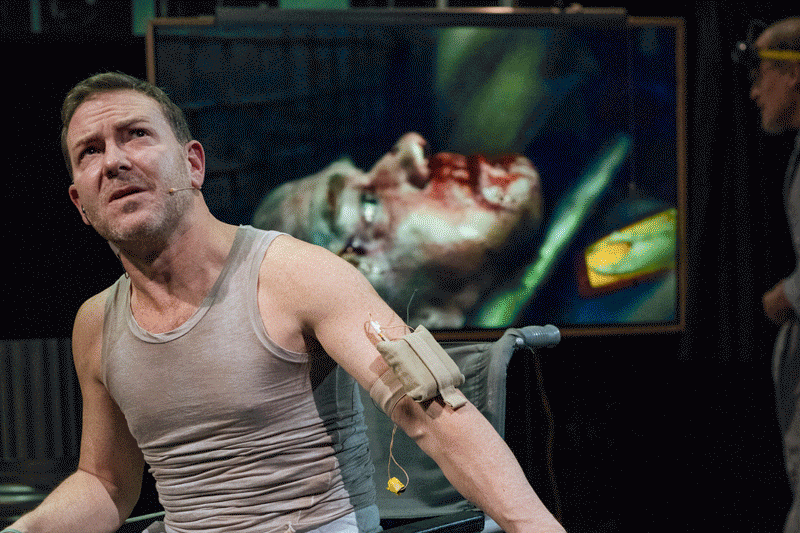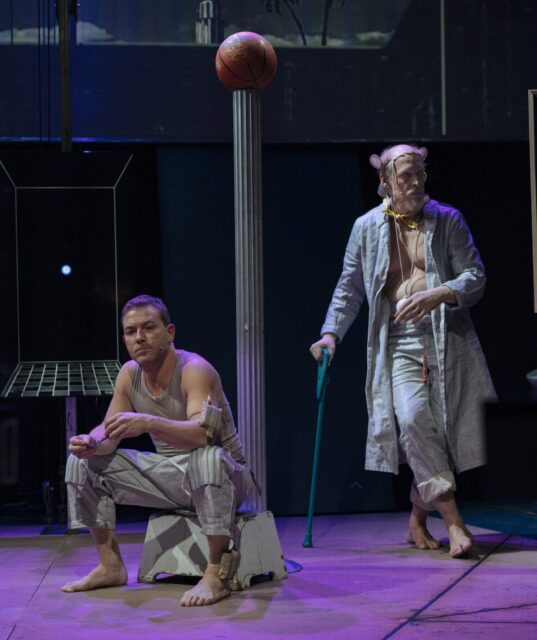
The Wooster Group revisits Richard Foreman’s avant-garde Symphony of Rats (photos © Spencer Ostrander)
SYMPHONY OF RATS
The Wooster Group
The Performing Garage
33 Wooster St. between Grand & Broome Sts.
Through May 9, $20 rush tickets, $35 in advance, 7:30
thewoostergroup.org
In 1988, the Wooster Group staged Richard Foreman’s Symphony of Rats, written, directed, and designed by Foreman, the treasured avant-garde playwright and founder of the Ontological-Hysteric Theater. In 2022, the company asked Foreman if it could present a new adaptation. Foreman responded, “You can do whatever you want! I hope it’s completely unrecognizable.”
Mission accomplished.
The 2024 iteration of Symphony of Rats is a hallucinatory journey into outer and inner space that begins with a fever dream in which Ari Fliakos offers, “Symphony of Rats is about the President of the United States as someone no different from the rest of us: a mixed-up, stupid, fallible person bounced back and forth by forces outside his control. The President is receiving messages by means other than the known senses, and he doesn’t know whether to trust them or not, just as we all receive messages . . . from our unconscious, . . . or God, . . . or the media, . . . or our past experience . . . , and often don’t know . . . whether to validate them by paying attention to them and acting upon them, or to dismiss them as . . . irrational impulses we hope will pass.”
It’s a necessary prelude, as everything that follows, under the precise direction of Elizabeth LeCompte and Kate Valk (who appeared in the 1988 original), is beautiful madness.

Ari Fliakos and Jim Fletcher star in Symphony of Rats at the Performing Garage (photo © Spencer Ostrander)
Fliakos plays the President, who sits in a wheelchair commode at a pair of tables at the front of the set. To his left is Guillermo Resto, who makes deep-voiced declarations through a basketball hoop on its side. To his right are Niall Cunningham, Andrew Maillet (who provides additional sound and video), and assistant director and stage manager Michaela Murphy, fiddling on laptops. Jim Fletcher moves around the stage, portraying a doctor, a scientist, a gnarly rat, and other characters.
LeCompte’s set also includes blackboards, clotheslines on which cardboard is pushed and pulled, an old easel, a narrow column with a basketball on top, a changing scenic backdrop, and projections of an adorable circular digital being who climbs up and down a pole and goes for a walk in its stick-figure-like body.
Over the course of eighty wildly unpredictable minutes, the actors break out into new tunes by Suzzy Roche (“The Door Song,” “The Human Feelings Song,” “The Ice Cream Song”), study an impressive fecal log that comes out of the President, debate going to the chaotic Tornadoville, contemplate ingesting a magic lozenge, discuss evolution and children’s books, recite William Blake’s “Tyger Tyger,” and watch clips from Ken Russell’s 1969 cinematic adaptation of D. H. Lawrence’s Women in Love and Steve Beck’s 2002 horror film Ghost Ship. There’s an MST3K aspect to the whole show, which features sound and music by Eric Sluyter, video by Yudam Hyung Seok Jeon, lighting by Jennifer Tipton and Evan Anderson, phantasmic costumes by Antonia Belt, and dramaturgy by Matthew Dipple. Tavish Miller’s technical direction is a marvel as complex audiovisual elements pop up everywhere.
Although you should not be obsessed with figuring out the details of what constitute the plot, there are references to the President’s mental well-being, world hunger, sleeping leaders, and environmental catastrophe, evoking the current sad state of the planet. There’s also a scene in which the President juggles the globe à la Charlie Chaplin in The Great Dictator.
“Trust me, trust me. It’s so much fun to be inarticulate, Mr. President. Trust me. It really is so much fun,” Jim advises. Later, the President admits, “I think I’m losing my mind.”
Everything in Symphony of Rats might not be immediately recognizable, but it is most certainly not inarticulate, providing provocative fun as only the Wooster Group can.
[Mark Rifkin is a Brooklyn-born, Manhattan-based writer and editor; you can follow him on Substack here.]